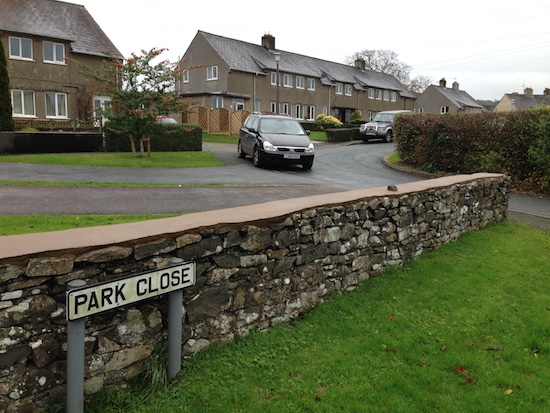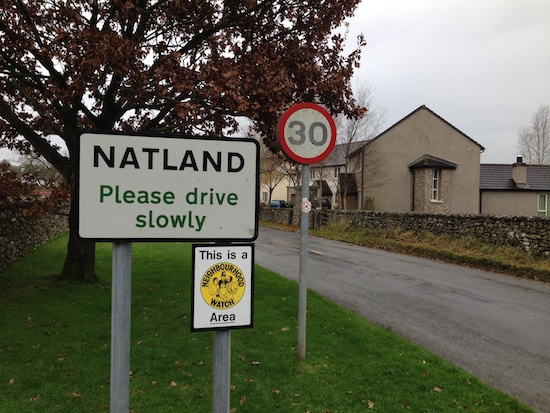Photo by Lakes Photographer
In a bistro in Kendal town centre, a customer is chatting to the waitress about how busy the restaurant seems. "I suppose there’s so much going on in town tonight," she says. "Yeah, Oliver! starts at quarter past seven, so I’m expecting it to quieten down after that," replies the waitress, who knows the local theatre schedules well. "And you’ve got the Kendal Parish Church event," the customer adds.
It’s a big night in Kendal alright, and that’s without even taking into account British Sea Power, who are returning to Cumbria on their Sea Of Brass tour. Tonight they’ll play a brass-backed show with Foden’s Band, just minutes from some of their childhood homes.
British Sea Power’s frontmen, Jan Scott Wilkinson (aka Yan) and Neil Hamilton Wilkinson, grew up in a three-bed council house in Natland, a mile outside Kendal. You reach the village via Natland Road: on its left are residential sidestreets called things like Rinkfield and Gallowbarrow; on its right is an enormous, bleak Clarks Shoes distribution centre. This is northern England, where place names filled with ancient folk magic are juxtaposed with stressed parents forcing velcro-strapped leather shoes onto the feet of bored schoolchildren. In their formative years, it’s also the place half of British Sea Power called home.
The former Wilkinson family home is in Park Close, the first street you see as you enter Natland. Facing this row of grey, pebbledashed, double-glazed homes are cow-filled fields that stretch out to the Lake District, while behind there are posh cottages, quaint bungalows and rugged hills rich in plant life. In the churchyard opposite the pristine village green, a bird sings a strange whirring song, and it’s easy to imagine Yan, Hamilton and their drumming pal Matthew ‘Woody’ Wood from down the road in Kendal exploring these ancient paths and developing their well-documented fondness for unusual wildlife.
But it’s equally easy to imagine how isolating a Natland childhood must have been. As a young man, the eldest Wilkinson child Roy (later British Sea Power’s manager) would impart the wisdom he’d learned as a music critic, schooling impressionable Yan and Hamilton in the ways of Kim Deal and Black Francis. Alternative rock’s impression on Natland has extended no further than Park Close though ‒ the only musical event advertised on the village noticeboard is St Mark’s Church Natland Presents: Desert Island Discs with ‘castaway’ Dr Ann Myatt, prospective Conservative candidate for parliament.

Similarly, a newspaper bill outside the Post Office reads: "COUPLE LIVED LAVISH LIFE ON BENEFITS". A typically inflammatory right-wing headline that stings with irony when read in a village whose most famous sons were raised by an elderly, unemployed father a few yards away. Roy describes the conditions of the Wilkinson family home in his British Sea Power biography Do It For Your Mum ‒ six kids, four of whom shared a bedroom while their parents slept on a sofa bed in the living room. Far from lavish, as Hamilton explains in the book:
"I never knew what dad did […] I was slightly embarrassed because he didn’t seem to have a job and he was older than everyone else’s dad. When I was about seven I somehow got the idea that our parents might be smackheads. I remember looking through their pockets for any evidence. They weren’t smackheads, of course."
Where luxury was lacking, however, enthusiasm thrived. One of the narratives of Do It For Your Mum revolves around Ronald Wilkinson who, in his late seventies, would become his sons’ band’s biggest fan and an alternative rock enthusiast in general, with a particular fondness for the Butthole Surfers. British Sea Power’s career would begin in earnest when they moved down south, and mum and dad have since moved back to Ronald’s native Sunderland (the couple were last seen campaigning for Sunderland AFC to change their entrance music at the Stadium Of Light to BSP’s ‘Monsters Of Sunderland’). But it’s Cumbria where the British Sea Power template was drafted, as Roy writes:
"Cumbria gave us both William Wordsworth and Stan Laurel. If pop music is at its best when it combines the wondrous and the ludicrous, here was a place that had both […] What would happen if we could combine these two factors in one band?"

Down at Factory, Kendal’s newest warehouse-turned-creative arts space, Yan is asking the people he grew up alongside, "Do you like my megalithic rock? Do you like my prehistoric rock?" On his left, there’s an indie rock band surrounded by foliage, strumming out the chords to their 14-minute masterpiece ‘Lately’; on his right, there’s Foden’s Band, dressed in bright red blazers and bow-ties, slowly turning the track into something like the most epic, unorthodox Christmas carol ever composed. It’s wondrous, ludicrous.
Later, when British Sea Power open their encore with ‘Waving Flags’, a gang of middle-aged men start pogoing. An indie band is playing its pro-immigration anthem in one of the most quintessentially English towns in Britain, while down the road the Tory parliamentary candidate is quietly selecting her Desert Island Discs. Wondrous, ludicrous. There’s an actual mosh pit happening at a brass band concert. Could this be any more wondrous, ludicrous?
The idea of British Sea Power performing a string of concerts with brass bands has, of course, an air of novelty to it, but by British Sea Power standards this is pedestrian stuff. They’ve played wild shows in seaside cafes, aboard boats and at embassies; they’re routinely joined on stage by roadies in the costumes of giant brown bear Ursine Ultra and the snowy white Bi-Polar Bear. At the very least, you can usually rely on fearless guitarist Martin Noble to pile into the crowd at the end, but not tonight. Perhaps the sharp-suited professionalism of Foden’s Band is rubbing off on them, because this is a strangely civilised BSP show.
It’s down to Foden’s Band then, to replace the rock & roll theatrics with brassy bombast. On ‘A Wooden Horse’, they add dramatic screeches that take the song’s light, jangling country chords to a dramatic, almost militaristic climax. ‘Atom’ is made as tense as an air-raid in the Blitz, with fairy lights frantically flashing across the plants onstage, the two bands crashing together and dissolving into dissonance. Even the natural wonder delicately evoked by ‘Spring Has Sprung’ takes on a renewed grandeur as star constellations are projected on the back wall and it feels like Foden’s Band are beginning to soar amongst them.
Unfortunately, when the brass is dialled down a notch, Hamilton’s fragile chords on ‘The Smallest Church In Sussex’ are effectively wrecked by the loud stream of conversation coming from the bar. (In fact, much of the first half of the show involved trying to find a decent spot where some pissed-up couple aren’t chatting loudly). I know Kendal’s well beyond the usual touring circuit, and there’s maybe a chunk of the gig-starved crowd who’ve simply come out casually to see "the band" rather than eagerly awaited for weeks the arrival of the almighty British Sea Power.

The turning point comes with ‘Machineries Of Joy’, normally a song of such peace and serenity, sounding bold and triumphant as Foden’s Band tear into the hook without restraint, dominating the room. By now the crowd are captivated and so are easily led by Yan, standing confidently centrestage, into the emotional onslaught of ‘Lately’. ‘The Great Skua’ packs an even more powerful emotional punch later on, as the crowd wrench their arms up above them and howl along to the hymnal "ah-ah-ah-ah-aaah" refrain.
Moments like this are at odds with the strange arrangement of ‘Lights Out For Darker Skies’ that closes the main set, with its fiery riff now all brassed up and sounding like the theme tune to a Saturday night ITV gameshow from the 1990s. You can almost picture Michael Barrymore running in to high-five the front row of the crowd. Still, it’s got one of the trumpeters quietly headbanging and those two words come to mind again: wondrous, ludicrous.
You have to wonder what the teenage British Sea Power would have thought of themselves 20 years later playing a brass band concert for all the locals who might otherwise be watching Oliver! at the town hall. For that matter, what would the twentysomething British Sea Power have made of it, as they toured the UK toilet circuit with Interpol and The Killers in the mid-2000s, had they known that it was all leading up to this? They’d probably have thought it was funny, but as with everything British Sea Power do, there’s a breathtaking poetic beauty coursing through Sea Of Brass too. This is a band born of the same stretch of fields as William Wordsworth and Stan Laurel: the apple doesn’t fall far from the tree.


